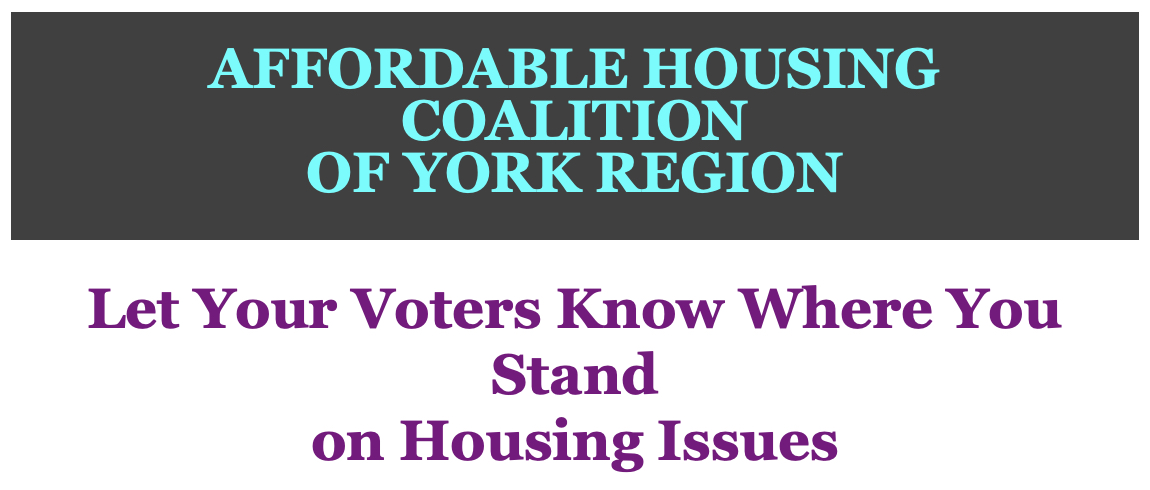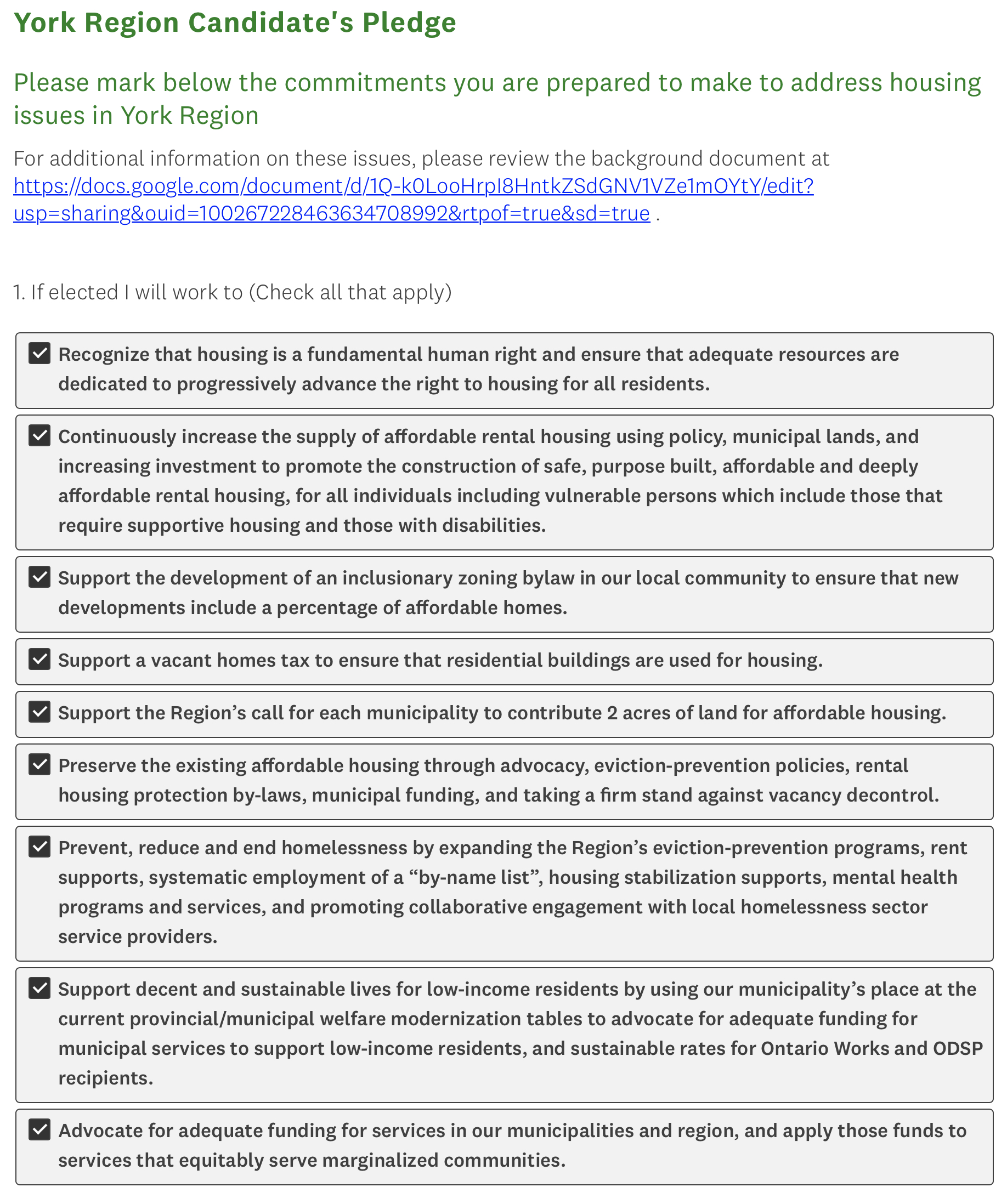I want to see more affordable housing in Newmarket - and across York Region. 
We are in the middle of a housing crisis. Too many people can't afford to put a roof over their head.
House prices here in Newmarket are soaring.
One in five homes is bought as an investment property.
Vacant homes
Scandalously, too many houses are left vacant for extended periods. I strongly favour a Vacant Homes Tax to discourage people from leaving properties empty for a long period of time.
And, as rents soar, people are paying an ever increasing percentage of their income on housing.
I've just completed a "Candidate's Pledge" which has been put together by the Affordable Housing Coalition of York Region (below).
It is full of specifics, and that's good.
Everyone is in favour of more affordable housing until you get into the policy detail, then people begin peel away.
Slippery slope
The Mayor of Markham, Frank "slippery slope" Scarpitti, told his colleagues at York Regional Council he was against a Vacant Homes Tax because of what would happen next. He predicted the authorities would soon be deciding if you are selfishly occupying property that is too large for your needs.
"If someone's an empty nester, a single widow in a single family home, are we going to start saying that's way too much space for someone and they should be taxed because they're not fully (occupying it)."
Preposterous.
Scarpitti sees an Orwellian future here in Canada where property taxes morph into some kind of Poll Tax. It's not the property that's taxed it's the number of people living in the house.
And he got away with this absurdity with no-one challenging him.
Gordon Prentice 2 October 2022
Click "read more" below to read the backgrounder from the Affordable Housing Coalition

York Region Municipal Election Candidate Pledge Backgrounder
This municipal election, we are calling on all candidates to recognize the most pressing issues that residents of York Region are facing, by signing the Municipal Election Candidate Pledge. The pledge consists of eleven individual commitments that focus on housing and homelessness.
While we hope all candidates will support all of the issues raised in the pledge, candidates are invited to support as many, or as few, as they choose.
This backgrounder outlines the underlying concerns behind the various elements of that pledge.
Right to Housing
Home is at the centre of human rights. Without adequate, accessible and affordable housing, with appropriate supports, our other human rights such as equality, liberty, dignity, privacy, freedom of expression, and even life are threatened. All levels of government have the obligation and ability to respect, protect and fulfill the right to adequate housing.
The Government of Canada passed the National Housing Act stating that all levels of government within Canada are required to recognize housing as a fundamental human right. Since then, municipalities have started to follow suit by publicly committing to housing as a human right. While it is understood that ensuring that every resident has access to adequate housing is not an easy task, all governments must commit to the progressive realization of a right to housing to the maximum of its available resources and by all appropriate means.
Affordable Housing
In York Region, the availability of affordable housing, with appropriate supports, where needed, has become a pressing issue. While the region and municipalities have made some strides to address affordable housing, including recognizing the housing situation as a Crisis in February 2021, the problem has worsened.
While there is an important role for the federal and provincial governments, the municipal partners are also critical and should commit to action both jointly and independently.
That means working at the municipal level, to develop new affordable homes using municipal policy tools and municipal resources, including
- Adopting newly available Inclusionary Zoning legislation to ensure new housing developments include affordable homes, as Toronto and Mississauga have done (a backgrounder is here)
- Adopting a Vacant Homes Tax, as very strongly supported in a recent Affordable Housing Coalition of York Region survey and a KPMG study, to discourage long-term vacancies and conversions of rental units to air BnBs ( for more info you can go here)
- Pursuing the decision by York Region to set aside Regional lands for housing, and to ask local municipalities to each set aside 2 acres of land every 5 years for affordable, supportive and seniors housing (more details on these policies are here )
Municipalities can also help preserving affordable homes that already exist. Thousands of affordable homes are lost every year in Canada. Many are lost when tenants get evicted, and the rent control is lifted, and the rents rise beyond affordability. Other rental units are converted to condos, where no rental housing protection policies are in place. It’s cheaper to keep rents affordable and people in their homes than to build new affordable units. (for some background look here)
Homelessness
York Region is experiencing a homelessness and affordable housing crisis. Covid illustrated that people who were homeless or on verge of losing housing were more vulnerable than the rest of the population. Still, shelter and housing policies that existed pre-Covid have not changed and homelessness and housing precarity are increasing. Coordinated steps are needed to address this crisis. Programs like rent supports, that help keep people from losing their homes are a good preventative measure. Supports for people in distress, like mental health and evictions prevention programs, that help stabilize tenancies, are also valuable. Once people are homeless, coordinating supports through better data tracking, “by name” lists, and expanding collaboration with homeless service providers, can manage the crisis. (information on these approaches can be found here)
Income Supports
Low social assistance rates are a key factor in preventing people living on low incomes from getting and sustaining adequate housing. The Government of Ontario has initiated a “modernization” of social assistance, which includes a number of changes to Ontario Works (OW) and Ontario Disability Support Program (ODSP).
Under the new plan :
- The province will centralize intake and allocations of benefits, increasingly on online platforms.
- Municipalities would take responsibility for all “stability supports” including referrals to local services like housing and mental health care.
- Various organizations, depending on the municipality, will be responsible for employment supports, in our area it is a company called WCG Services.
How all that will work is still evolving. The province is meeting with municipalities jointly at Provincial-Municipal Social Assistance and Employment Committee tables to work out critical details.
Some concerns people have about those table include:
- How will municipalities take responsibility for getting people access to supports when those supports, like mental health care, housing, counselling, and childcare, are underfunded with massive waiting lists.
- How will anyone get to a stable life while trying to live on the current OW allocation of just $733 per month or ODSP allocation of $1,169/month.
- How can people with disability seek employment when their incomes are 40% below the poverty line and they need devices and supports to enable them to work
Municipal leaders have a voice in that process. Will you use yours to address the issues affecting vulnerable residents in our Region?
